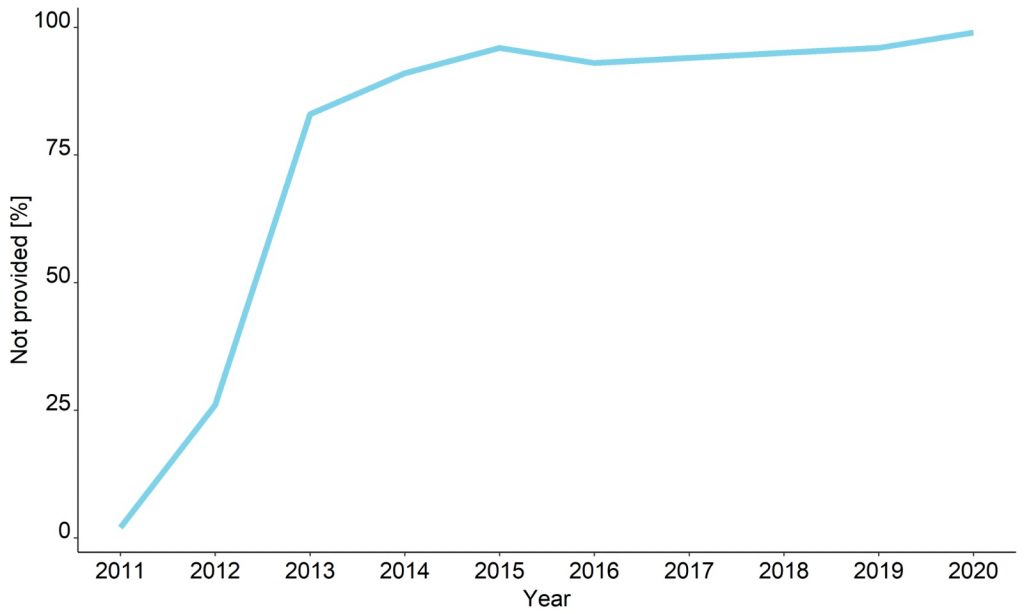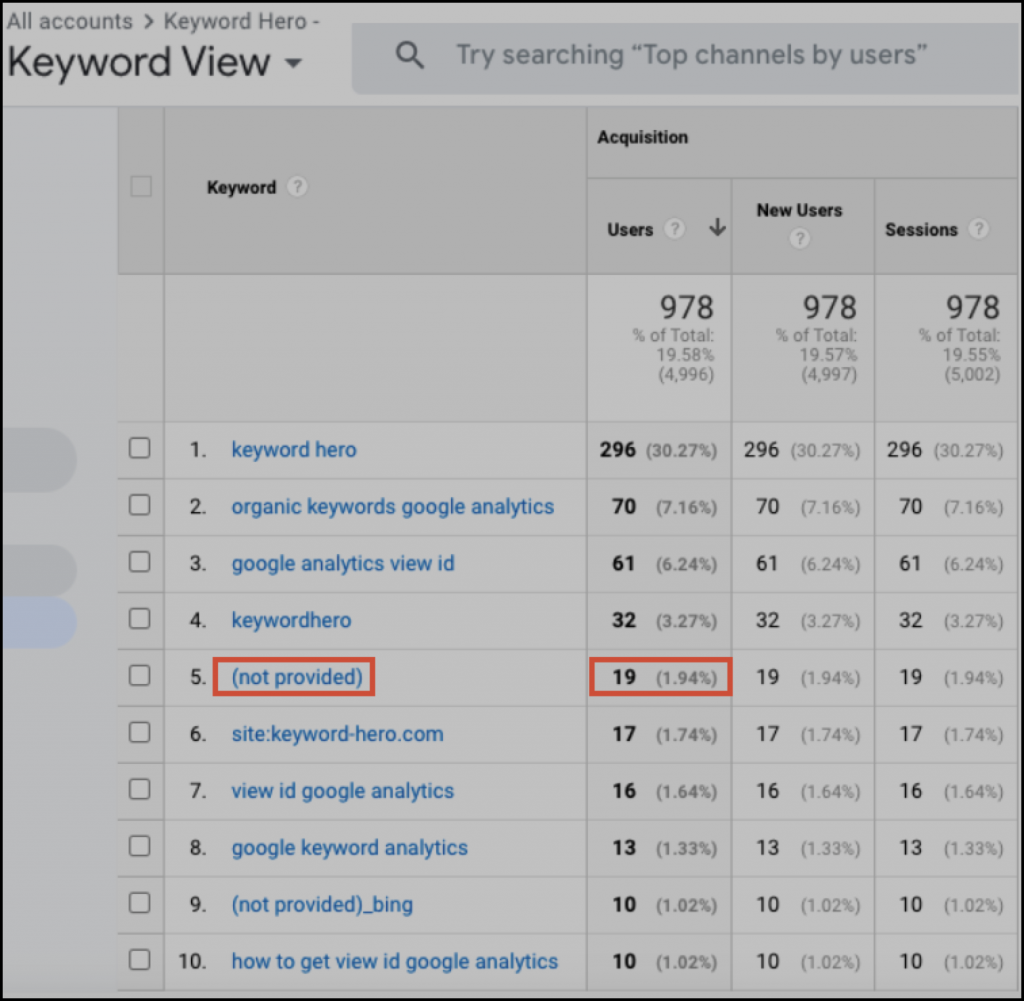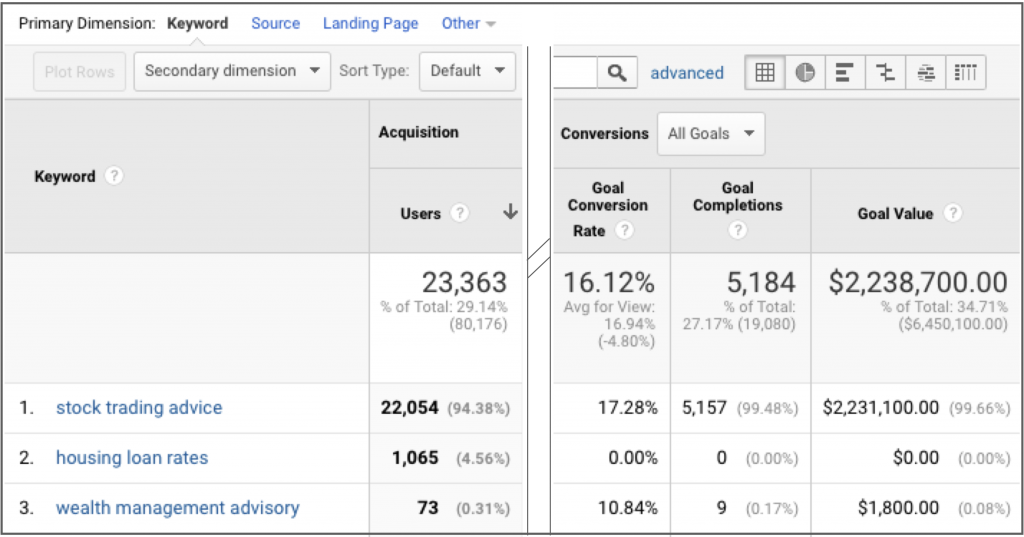Back in 2011 when keywords started disappearing from the Organic Search report in Google Analytics, it was a hot topic in SEO, and since the percentage of (not provided) has passed the 99% mark, it is once again a topic of conversation in SEO communities.
Why is that?
One reason for the renewed interest is that when something is almost 100% it triggers a psychological response.
It signifies that in the coming year no keywords will remain visible in Google Analytics.
And second, SEOs are beginning to realize that Google Search Console only provides us with a small percentage of these organic search terms.
Google Search Console is ok for a quick snapshot of position, clicks, etc, but when it comes to the search queries report there is a lot of data missing.
Why is keyword not provided in Google Analytics?
The primary reason is to protect user privacy. But, Google also left a back door option to retrieve this data by reverse engineering the data back into Google Analytics.
If you now navigate to Acquisitions | Overview | Organic Search.
You will see (not provided) and (not set) as 99+ percent of your keywords.

The percentage of (not provided) used to be as low as 5%.
You can see the percentage trend of (not provided) in Google Analytics since 2011.

The more cynical SEOs point to this being a power play by Google to nudge SEOs to pay for these keywords through Google Ads.
However, the keywords you see on Acquisition | Google Ads | Search Queries, relate only to keywords that you have paid for people to notice and click on.
Paid keywords are different to organic keywords, and there is no point in making any assumptions about an overlap.
Using Keyword Hero to get these keywords back
Keyword Hero uses advanced data processing to make sense of large data sets to get (not provided) back into Google Analytics. It requires a seven-step process conducted by a team of data scientists from the Fraunhofer Institute.
Search Engine Watch and Rand Fishkin talk about it being a data science problem, where before the limiting factor was the cost and speed required to upload the information back into Google Analytics at scale.
Once you are set up with Keyword Hero, you can expect to see (not provided) down to less than 2% of all organic keywords.

Why should I care?
Google Analytics is still the most powerful free tool to analyze web data including user behavioral metrics and page conversions.
This data is not only useful for SEOs, PPC managers, and sales teams, but also company-wide.
That is because what people search for on the Internet gives us the closest idea of what they want and need. Here’s an example of what I mean.
Let’s say a sales rep calls up a company to cold pitch a product. If he knew the exact search terms people were using he can integrate these questions and words into the pitch.
If this sales executive worked for an AI chatbot company, he could check what keywords people are using, for instance, the long-tail keyword ‘ROI on conversational AI’ and use this to frame his pitch. It’s a clever way of using the right words to connect with your target audience.
PPC managers can also incorporate keyword analytics to reduce ad campaign costs.
By using the organic keywords with the highest organic conversion rates digital marketers have a chance to reduce ad spend, equipped with information on the conversion potential of a keyword before bidding on it.
SEOs can find conversion keywords
The overarching OKR of the SEO department is to increase goal conversions. That can be page views for a web publisher or sales for an ecommerce merchant.
But how can you track keyword conversions without any keyword data?
You can still track conversion per channel on Google Analytics, but without seeing conversions by keyword you are missing a rich vein of behavioral data.
Let’s run through a quick example of why this is important.
Say a financial services company checked the Organic Search report in GA and discovered that the three keywords driving the most traffic were ‘stock trading advice, ‘housing loan rates,’ and ‘wealth management advisory’.

The above three keywords account for 98% of all organic traffic.
Yet, the keywords ‘stock trading advice’ and ‘wealth management advisory’ have an average conversion rate of 14%, while people searching for ‘housing loan rates’ didn’t convert at all.
Given how much traffic people searching for ‘housing loan rates’ brings to the website, it seems strange that there is not a single conversion.
This could be because the related landing page is not optimized for this keyword. Using some straightforward keyword optimization strategies, the company could expect a windfall in conversions.
Using organic keywords in PPC ads
Another interesting discovery from the above example is that the keyword ‘stock trading advice’ resulted in a goal value of $2.2 million for the period in question.
If this financial services firm wanted to increase revenue in their stock market advisory service, the digital marketing team could place ads targeting this keyword and semantically related terms for the best chance of exceeding campaign ROI targets.
Going into a new ad campaign blind—without organic keyword information—can be a costly learning curve. You might be two days into a campaign before you realize that a specific keyword is underperforming.
But, with a list of organic keywords that you know will convert, you can have a better idea of what keywords to bid on.
Can I use Google Search Console to find keywords?
Yes, you can. But bear in mind that there are limitations to using Google Search Console as an answer to a common SEO question: Why is keyword not provided in google analytics?
Each of these valuable web analytics tools serves a different purpose.
Google Analytics is user-oriented.
It shows you who visits and interacts with different pages on your website.
Google Search Console is search-engine focused.
It shows you how to improve visibility and rank in the Serps.
As such, both tools provide different metrics, with Google Analytics guided by clicks and Google Search Console by impressions.
This is why we use both along with 7 other data sources to get back 100% of all keywords.
Data transparency of Google Search Console
Google Search Console data has been consolidated for several years based on the canonical Url given in an Html page.
Hence, Google is layering over the data for which Url was displayed in the search results.
For websites with multiple pages, this can create problems.
It means that configuration errors, redirects, Amp conversions, etc can no longer be uniquely tracked.
The search console Api counts and delivers keywords as a combination of keyword / term, Url, device, and country.
Terms are delivered as multiple different combinations.
Keyword Hero counts each keyword once for a more precise estimation.
It’s free to use too, with a risk-free three-month trial.


